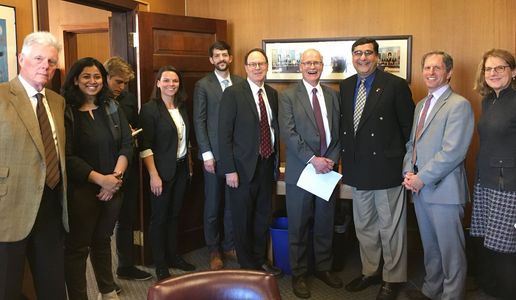Najam Testifies to MA Senate on Climate Bill

Adil Najam, Dean of the Frederick S. Pardee School of Global Studies at Boston University, testified before the Massachusetts Senate Joint Committee on Revenue on October 31, 2017 in support of bill S.2056, an act enabling taxpayer donations to the Least Developed Countries Fund, a special United Nations fund focused on helping the people and communities who are the most susceptible to the effects of climate change and who have the fewest resources to adapt and protect themselves.
The bill was sponsored by Massachusetts State Senator Michael J. Barrett in order to create a voluntary checkoff on state tax returns to help the most vulnerable countries cope with climate change. The Boston University Institute for Sustainable Energy leads the Coalition for the Massachusetts Least Developed Countries Fund and helped organize testimony on the bill.
In his testimony, Najam said the bill demonstrates that Massachusetts remains a leader in the global fight against climate change, and proves that the citizens of Massachusetts are not willing to abdicate leadership on climate change even if Washington, DC is. Najam also argued that the bill provides the ability at the local level to support an international initiative like the Least Developed Countries Fund.
Najam testified alongside Barrett; Barbara Kate-Garnick, Professor of Practice at The Fletcher School at Tufts University and Former Undersecretary of Energy for the Commonwealth of Massachusetts; Dustin Schinn, Climate Change Specialist at Global Environmental Facility; Abby Maxman, President of Oxfam America; and David W. Cash, Dean and Associate Professor at the John W. McCormack Graduate School of Policy and Global Studies at the University of Massachusetts and Former Massachusetts Commissioner of Energy Resources.
The Least-Developed Countries Fund (LDCF) has been used for projects to mitigate the devastation of climate change and enhance a country’s resiliency. Projects reduce the vulnerability of resources that are central to development and livelihoods, such as water, agriculture and food security, health, disaster risk management and prevention, infrastructure, and fragile ecosystems.